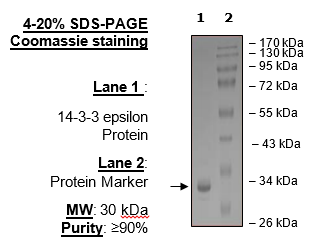14-3-3 epsilon Protein, His-tag (Human) Recombinant
Catalog #
79025
$395
*
●
●
Purchase
Description
Human 14-3-3 epsilon Protein, GenBank Accession No. NM_006761, full length, with N-terminal His tag, expressed in Sf9 insect cells using baculovirus. MW = 30 kDa.
●
Synonyms
YWHAE, MDS, MDCR, KCIP-1, 14-3-3E, FLJ45465
●
Product Data Gallery
Product Info
Storage and Usage
Citations
Species
Human
Host Species/Expression System
Sf9 insect cells using baculovirus
Formulation
50mM sodium phosphate, pH 7.0, 300mM NaCl, 150mM imidazole, 0.1mM PMSF, 0.25mM DTT, 25% glycerol
MW
30 kDa
Amino Acids
YWHAE, MDS, MDCR, KCIP-1, 14-3-3E, FLJ45465
Genbank #
NM_006761
UniProt #
P62258
Background
14-3-3 epsilon also known as tyrosine 3-mono-oxygenase/tryptophan 5-monooxygenase activation protein is a member of the 14-3-3 family. 14-3-3 epsilon has been reported to be involved in heat shock transcription factor 1 (HSF1) and extracellular signal regulated protein kinase (ERK) pathways (1). 14-3-3 epsilon interaction with the deubiquitinating enzyme UBPY, also known as USP8, regulates cargo sorting and membrane traffic at early endosomes. Association of 14-3-3 epsilon, HSF1 with ERK during heat shock may modulate the amplitude of the response and control the termination of HSP expression on resumption of growth conditions (2).
References
1. Wang, X. et al: Interactions between extracellular signal-regulated protein kinase 1, 14-3-3epsilon, and heat shock factor 1 during stress. J. Biol. Chem. 2004; 279(47):49460-9.
2. Mizuno, E. et al: 14-3-3-dependent inhibition of the deubiquitinating activity of UBPY and its cancellation in the M phase. Exp Cell Res. 2007; 313(16):3624-34.


